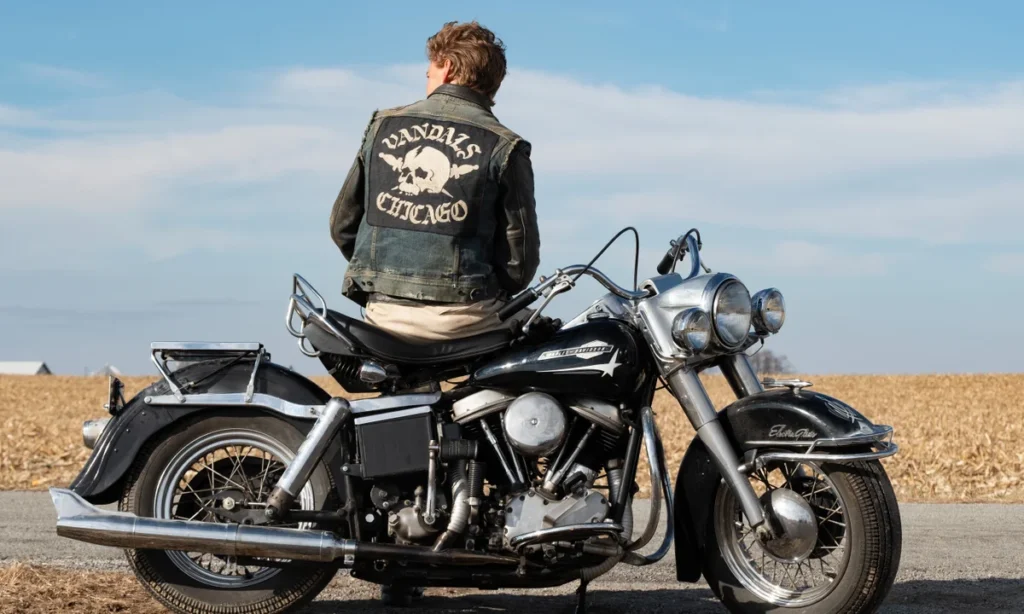
The Bikeriders is a gritty, visceral ride through the world of an outlaw motorcycle club, a film that peels back the layers of myth and bravado to reveal the humanity, violence, and brotherhood that define the subculture. Directed by Jeff Nichols, this movie, inspired by Danny Lyon’s iconic 1967 photo book of the same name, dives deep into the lives of the men and women who live on the fringes of society, embracing the freedom and danger that comes with life on the road.
Set in the 1960s Midwest, The Bikeriders follows the rise of the fictional “Vandals” motorcycle club, exploring their close-knit community and the turbulent dynamics that threaten to tear them apart. The film centers around three main characters: Johnny (Tom Hardy), the club’s charismatic and volatile leader; Kathy (Jodie Comer), a strong-willed woman who finds herself drawn into the club’s orbit; and Benny (Austin Butler), a young, impressionable member who looks up to Johnny and is trying to find his place in the world.
Tom Hardy delivers a commanding performance as Johnny, capturing the character’s magnetic presence and underlying menace. Johnny is a man who lives by his own rules, driven by a fierce sense of loyalty to his brothers but also a simmering rage that often bubbles over into violence. Hardy plays him with a mix of swagger and vulnerability, making Johnny a complex and unpredictable force at the center of the film. His portrayal of the club’s leader is both terrifying and captivating, embodying the duality of a man who is both a protector and a destroyer.
Jodie Comer is equally compelling as Kathy, the film’s emotional anchor. Kathy is no shrinking violet; she’s tough, resourceful, and unafraid to stand up to Johnny and the other men in the club. Comer brings depth and nuance to the role, portraying Kathy as a woman caught between her love for Johnny and her desire for a life that’s more stable and less dangerous. Her journey is one of the most compelling aspects of the film, as she grapples with the allure of the biker lifestyle and the harsh realities that come with it.
Austin Butler shines as Benny, the young biker whose journey from wide-eyed newcomer to hardened member serves as the audience’s entry point into the club’s world. Butler’s performance is understated but powerful, capturing Benny’s gradual transformation as he becomes more deeply enmeshed in the club’s activities. His relationship with Johnny is central to the story, with Benny both idolizing and fearing the older man. Butler conveys this complex dynamic with subtlety, making Benny’s eventual disillusionment all the more poignant.
Visually, The Bikeriders is stunning, with Nichols and cinematographer Adam Stone creating a world that feels both raw and lived-in. The film’s gritty aesthetic is perfectly suited to the subject matter, with scenes of roaring motorcycles, dusty roads, and dive bars immersing the audience in the harsh realities of the biker lifestyle. The attention to period detail is impeccable, from the leather jackets and tattoos to the vintage bikes and soundtrack, which pulses with the sounds of classic rock and blues, adding to the film’s authentic, rebellious atmosphere.
The film’s narrative structure is somewhat unconventional, interweaving the main story with interviews and flashbacks that provide insight into the characters’ pasts and the history of the club. This approach allows the film to delve into the motivations and backstories of its characters, adding layers to the otherwise straightforward tale of loyalty, betrayal, and violence. The interviews, presented in a documentary-style format, give the film a quasi-historical feel, as if we’re watching a true account of a real motorcycle gang’s rise and fall.
One of the film’s strengths is its exploration of the camaraderie and brotherhood that define the biker community. The Bikeriders doesn’t romanticize the violence or criminal activity associated with the club, but it does show the deep bonds that form between its members. The film is as much about the code of loyalty and honor that binds these men together as it is about the dangers and temptations that threaten to pull them apart. Nichols does a masterful job of balancing these elements, creating a film that is both a character study and an exploration of a subculture that is often misunderstood or glamorized.
However, The Bikeriders isn’t just a testosterone-fueled action flick. It’s a film that digs into the emotional and psychological toll of living on the edge. The characters are constantly grappling with their identities, torn between the need for freedom and the consequences of the choices they’ve made. The film raises questions about the nature of rebellion, the cost of loyalty, and the struggle to find meaning in a world that often seems indifferent to individual suffering.
Despite its many strengths, The Bikeriders may not be for everyone. Its unflinching portrayal of violence and the sometimes grim realities of the biker lifestyle can be tough to watch. The film’s pacing is deliberate, with long stretches of tension-building that may feel slow to some viewers. But for those who are willing to immerse themselves in the world that Nichols has created, The Bikeriders offers a rewarding and thought-provoking cinematic experience.
In the end, The Bikeriders is a powerful, evocative film that captures the spirit of rebellion and the complexities of a subculture that lives by its own rules. Anchored by stellar performances from Hardy, Comer, and Butler, and supported by a strong script and striking visuals, it’s a film that stays with you long after the credits roll. Whether you’re a fan of biker films or simply interested in a well-crafted drama about life on the margins, The Bikeriders is a ride worth taking.

